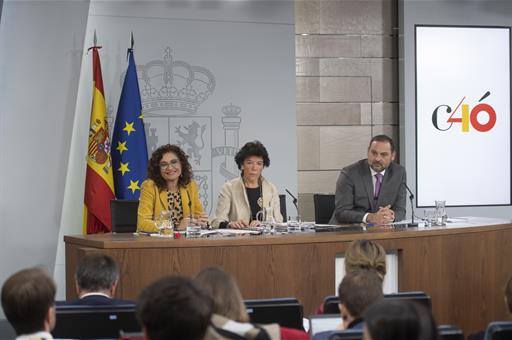Council of Ministers
Government changes law to ensure citizens no longer pay mortgage tax
Council of Ministers - 2018.11.8
Moncloa Palace, Madrid
The Minister for the Treasury, María Jesús Montero, reported that the Council of Ministers, as announced on Wednesday by the President of the Government, approved a Royal Decree-Law to amend the Property Transfer and Stamp Duty Act to ensure that "citizens do not have to this tax anymore when taking out a mortgage, and that henceforth this will be paid by the banks".
María Jesús Montero recalled that the Plenary Session of the Judicial Review Division of the Supreme Court decided to rectify the criteria on Tuesday of a previous ruling by the same court which forced the banks to pay this tax. "This has caused great social alarm and also legal uncertainty for our citizens and for the mortgage market itself", she said.
The minister stated that the government respects the separation of powers, but regrets the change of criteria. She also argued that the government has a responsibility to "oversee the general interest of citizens and guarantee the legal certainty of the regulatory framework for the normal functioning of the mortgage market".
In this regard, María Jesús Montero defended the government's decision to act swiftly to amend the law so that banks pay this tax as from Saturday, the date on which the new Royal Decree enters into force. The new legislation will apply to mortgages formalised as from that day. The urgency of this amendment is justified by the confusion caused by "the controversial decision of the Supreme Court", said the minister, and by the need to clarify the taxpayer of this levy.
 Pool Moncloa/Borja Puig de la BellacasaThe minister clarified that the fundamental change approved is the inclusion of a new paragraph in Section 29 of the Property Transfer and Stamp Duty Act which establishes that "the lender will be considered to be the taxpayer of public deeds for mortgage guarantee loans".
Pool Moncloa/Borja Puig de la BellacasaThe minister clarified that the fundamental change approved is the inclusion of a new paragraph in Section 29 of the Property Transfer and Stamp Duty Act which establishes that "the lender will be considered to be the taxpayer of public deeds for mortgage guarantee loans".
The text approved on Thursday also amends Section 15 of the Corporate Income Tax Act, which introduces that "this expense will not be considered to be deductible by the lender". In other words, the banks may not deduct this tax.
María Jesús Montero clarified that the government has ruled out eliminating this tax because it brings in 2 billion euros in revenue to regional governments which contribute to financing healthcare, education and long-term care.
Client protection
María Jesús Montero added that the Ministry of Economy and Business is working in parallel on the creation of an Authority for the Defence of Clients of Financial Products, an entity that will oversee matter to prevent the creation of abusive clauses that pass on the cost of the tax to consumers.
The government, added the minister, wishes to send out a message of calm to citizens and act with responsibility by taking on the powers to return certainty to the mortgage market and guarantee citizens' rights.
In turn, the Minister for Education and Vocational Training, and the Government Spokesperson, Isabel Celaá, highlighted that the government thus declares "its will to stand by its citizens and provide such support as is necessary to the regional governments, which are the depositories of this tax".
Better road safety and management
The government has approved a series of urgent measures on roads and highways with the aim of ensuring more effective management and guaranteeing safety on journeys.
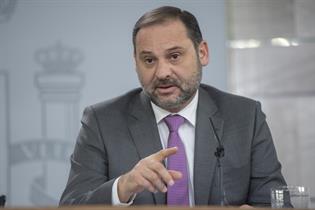 Pool Moncloa/Borja Puig de la BellacasaThe Minister for Public Works, José Luis Ábalos, explained that one of the amendments consists, henceforth, of highway projects that incorporate expropriations implicitly including the declaration of public ownership. This will allow expropriations to be urgent and speed up the development of projects.
Pool Moncloa/Borja Puig de la BellacasaThe Minister for Public Works, José Luis Ábalos, explained that one of the amendments consists, henceforth, of highway projects that incorporate expropriations implicitly including the declaration of public ownership. This will allow expropriations to be urgent and speed up the development of projects.
A second change regulates the obligations of certain heavy vehicles travelling on conventional highways instead of on motorways. José Luis Ábalos recalled that this measure was set up last summer on the AP-7 in Catalonia and is being called for in many other regions, since the impact on accident rates is very positive. This practice will be accompanied by discounts on hauliers affected and charged to the Ministry of Public Works.
Another of the measures approved on Thursday is for tougher penalties on the concessionaire companies that negligently prejudice users. The minister recalled the "absolute unforeseeability" of last year's major snowfalls "and, in the end, the fines applied to this end are wholly unrelated to the damages and losses actually produced". The maximum penalty, which stands at 15,000 euros at present, could rise to as high as 300,000 euros.
Lastly, toll charges by the State Land Transport Infrastructure Company (Seittsa), which manages the recovered radial highways will be covered by law.
Sustainability of the network
José Luis reiterated the government's commitment to not proceed to extend those concessions that end during this term of office, such that these motorways will be incorporated into the general network of free usage. The next toll road to do so, he pointed out, is the AP-1 in Burgos, which ends its concession on 30 November.
In parallel, the Minister for Public Works invited all the political formations to reflect on the sustainability of the motorway network. "With the exception of toll roads", he argued, "none of the other highways involve any form of contribution by users or residents, except for tourist or commercial purposes that lead to the deterioration of the highway, and yet there is not form of reversion". José Luis Ábalos advocated employing the same model throughout Spain instead of the current situation in which the use of highways is levied in some regions but not in others.
Exhumation of Francisco Franco
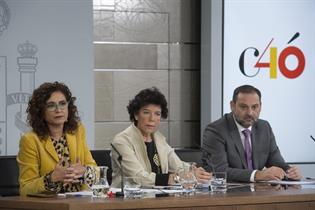 Pool Moncloa/Borja Puig de la BellacasaIsabel Celaá reported that the Council of Ministers, once the plea proceedings have concluded, will continue with the administrative process to exhume the remains of the dictator Francisco Franco from the Valley of the Fallen.
Pool Moncloa/Borja Puig de la BellacasaIsabel Celaá reported that the Council of Ministers, once the plea proceedings have concluded, will continue with the administrative process to exhume the remains of the dictator Francisco Franco from the Valley of the Fallen.
The Government Spokesperson explained that the government has commissioned the Minister for Justice, Dolores Delgado, to send the project necessary to carry out the exhumation to the Town Council of San Lorenzo de El Escorial, which will be drafted by the technical services of National Heritage.
The Minister for Justice will also request a non-binding report from the Directorate General of Public Health of the Health Department of the Region of Madrid - the competent body on matters of mortuary healthcare - on the exhumation process, which must be issued within a maximum period of one month. Following that, a 10-day period will commence so that affected parties can present their pleas, which will bring the procedure to an end.
The minister stressed that "2019 will begin without having a dictator that can be glorified in a public place", with the full backing of the law.
Research projects
The Council of Ministers authorised the 2018 round of proposals for 'Severo Ochoa' centres of excellence and 'María de Maeztu' units of excellence', managed by the State Research Agency. This initiative will fund the best research centres and units in Spain with up to 32 million euros over four years.
Isabel Celaá stressed the importance of "identifying genuine research projects" that lead to progress in the creation of knowledge and new centres of excellence to incorporate them in the Severo Ochoa and María de Maeztu schemes.
Regulation of real estate credit agreements
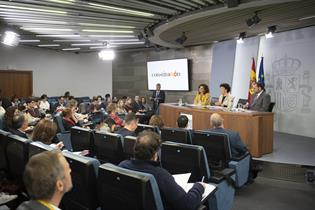 Pool Moncloa/Borja Puig de la BellacasaThe government decided to ask the Upper House of Parliament to push through, under the fast-track procedure, the Draft Law Regulating Real Estate Credit Agreements, which transposes an EU Directive on credit agreements entered into with consumers for residential use properties. The deadline for the transposition ended on 21 March 2016, and hence disciplinary proceedings have been opened against Spain.
Pool Moncloa/Borja Puig de la BellacasaThe government decided to ask the Upper House of Parliament to push through, under the fast-track procedure, the Draft Law Regulating Real Estate Credit Agreements, which transposes an EU Directive on credit agreements entered into with consumers for residential use properties. The deadline for the transposition ended on 21 March 2016, and hence disciplinary proceedings have been opened against Spain.
The Government Spokesperson stressed that Spain "does not want to pay fines for breaching Directives", and hence has requested this fast-track procedure so that the law can be pushed through in 20 calendar days.
Other agreements
- The Council of Ministers analysed the draft bill to transpose the EU Directive regulating the activities and supervision of Employment Pension Funds
- The government regulated the concession of subsidies under the 2019 Common Agricultural Policy campaign
Budget negotiations
In her assessment of political current affairs, Isabel Celaá called on the political forces to negotiate the National Budget for 2019. These public accounts, she stressed, are necessary to ensure that the sustained growth of the economy is not only reflected in the main figures, but also in the recovery of rights lost during the crisis.
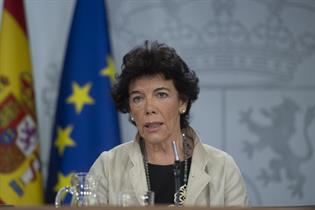 Pool Moncloa/Borja Puig de la Bellacasa"This Budget, which affects pensions, unemployment benefits, science - which means knowledge creation - and education, is worthwhile in helping improve people's lives", she said.
Pool Moncloa/Borja Puig de la Bellacasa"This Budget, which affects pensions, unemployment benefits, science - which means knowledge creation - and education, is worthwhile in helping improve people's lives", she said.
The Government Spokesperson mentioned at the start of her speech the death of at least 13 people this week who tried to reach the Spanish coastline by raft. Isabel Celaá conveyed her condolences to their families and highlighted that the government wishes "to once again stress the need to pay close attention to migratory flows, above all in the countries of origin and transit, and to pass on this concern to Europe and the rest of the world".





